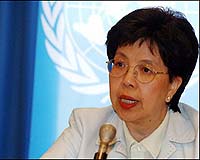| . |  |
. |
Sydney (AFP) July 16, 2009 Australia warned Thursday it could face 6,000 swine flu deaths this year in a "worst-case scenario", as nervous governments tried to curb the pandemic and keep tabs on potentially risky public events. The gloomy projection came as the number of A(H1N1) infections grew around the world, with Canada saying more than 200 school children had contracted the virus at summer camp. Australian Health Minister Nicola Roxon stressed that the number of deaths was likely to be lower than the "worst-case" projection, which was based on an assumption of a lack of vaccines and anti-viral drugs. "We could expect around 6,000 deaths across the country," she told ABC radio. "That's really the worst-case scenario that is being projected at the moment." Australia -- the Asia-Pacific nation worst-hit by the pandemic, with 11,194 infections, or nearly 12 percent of the global total of 94,500 confirmed by the World Health Organization -- is planning a mass vaccination scheme in October. WHO chief Margaret Chan warned on Wednesday that a vaccine to combat the surging pandemic would not be readily available for months. In South America, site of some of the highest infection rates, health ministers from six countries met in Buenos Aires to coordinate defences against the virus. The ministers from Argentina, Bolivia, Brazil, Chile, Paraguay and Uruguay expressed alarm at the momentum the A(H1N1) virus has picked up in the southern hemisphere's winter. Argentina has reported 137 swine flu deaths and more than 3,000 infections, giving it the worst fatality toll in the world after the United States, where 211 deaths and some 37,000 infections have been recorded. The WHO has reported about 430 deaths worldwide. Uruguay's president, Tabare Vazquez, said Wednesday that swine flu appeared "more benign" than run-of-the-mill seasonal flu, which kills tens of thousands every year. But Chilean President Michelle Bachelet said the flu outbreak was the "worst in 50 years." In Canada, which has seen 25 swine flu deaths, according to WHO figures, hundreds of school kids contracted the virus at three summer camps in the eastern province of Ontario, local health authorities said. "The total number of campers combined among these three camps that are affected is 227 ill out of a total of 1,275 campers," local health official Charles Gardner told broadcaster NBC. "They're not severe, I would say, certainly none have required hospitalisation." Elsewhere officials were closely monitoring sports and entertainment events after South Korea scrapped several gatherings when more than a dozen Indonesians attending a choir contest there tested positive for the virus. In rugby-mad New Zealand, officials urged fans to stay away from the Tri-Nations rugby Test against Australia if they had swine flu symptoms. "If you have symptoms, don't go -- you might feel well enough, but be considerate to everyone else," deputy public health director Fran McGrath told the New Zealand Herald. In one unusual measure, a British bishop advised churches to ban holy water as part of hygiene efforts. "Some churches have a stoup for holy water near the entrance to the church door and people are invited to dip a finger in this, and to make the sign of the cross. "The water contained in stoups can easily become a source of infection and a means of rapidly spreading the virus," said the Bishop of Chelmsford, John Gladwin. "This practice should be suspended" in Chelmsford diocese. He also urged caution when taking Holy Communion, warning if anyone had flu-like symptoms, the "priest alone should drink wine from the chalice." Britain is Europe's worst hit country, with 17 people dying after contracting swine flu. burs-njc/sst Share This Article With Planet Earth
Related Links Epidemics on Earth - Bird Flu, HIV/AIDS, Ebola
 WHO chief doubts speedy swine flu vaccinations
WHO chief doubts speedy swine flu vaccinationsLondon (AFP) July 15, 2009 The world's top health official said Wednesday a vaccine to combat the surging swine flu pandemic would not be readily available for months as the number of deaths from the virus spiralled. The comments by World Health Organization chief Margaret Chan came as Australia and Japan reported a surge in cases of the A(H1N1) virus, and Argentina dramatically upped its death toll from 94 to 137 in ... read more |
|
| The content herein, unless otherwise known to be public domain, are Copyright 1995-2009 - SpaceDaily. AFP and UPI Wire Stories are copyright Agence France-Presse and United Press International. ESA Portal Reports are copyright European Space Agency. All NASA sourced material is public domain. Additional copyrights may apply in whole or part to other bona fide parties. Advertising does not imply endorsement,agreement or approval of any opinions, statements or information provided by SpaceDaily on any Web page published or hosted by SpaceDaily. Privacy Statement |